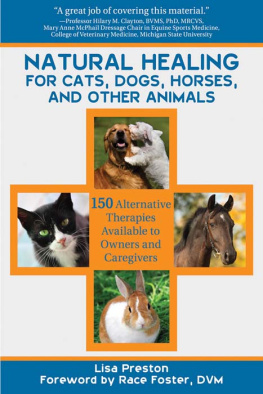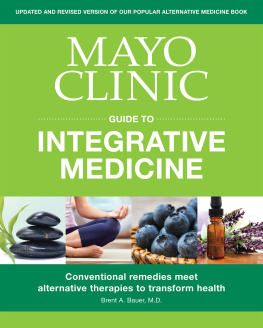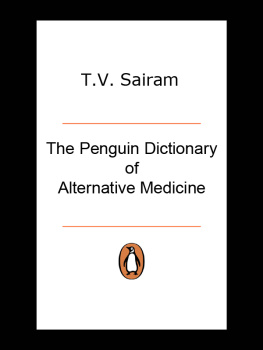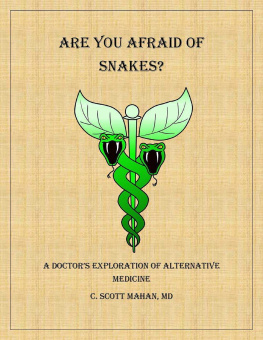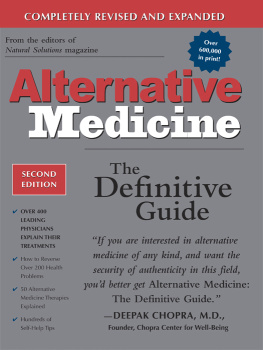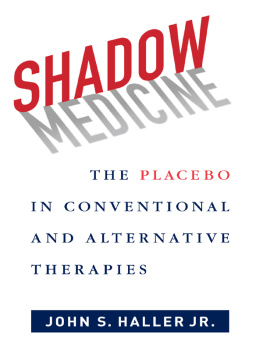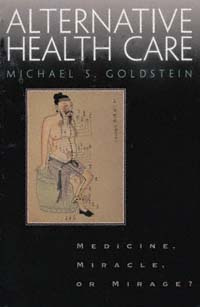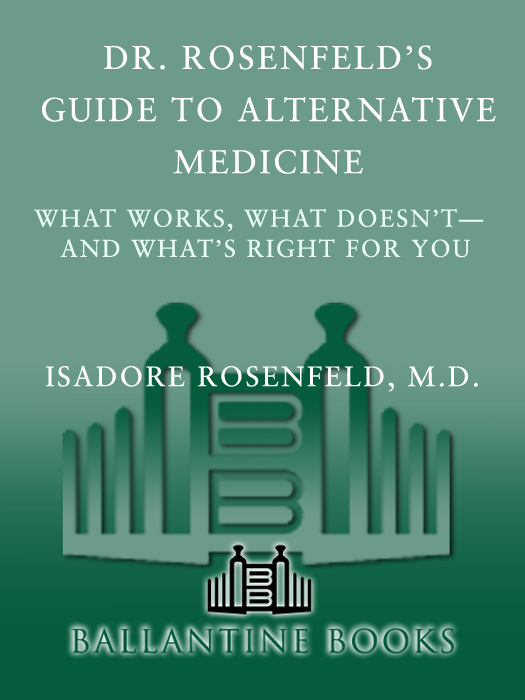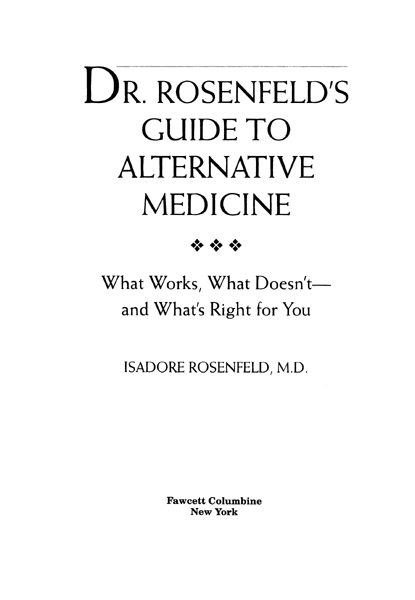A Fawcett Columbine Book
Published by Ballantine Books
Copyright 1996 by Isadore Rosenfeld, M.D.
All rights reserved under International and Pan-American Copyright Conventions. Published in the United States by Ballantine Books, a division of Random House, Inc., New York, and simultaneously in Canada by Random House of Canada Limited, Toronto.
Grateful acknowledgment is made to the following for permission to reprint previously published material:
University of TexasHouston: Yoga instruction from the January 1996 Lifetime Health Letter. Reprinted by permission of the University of TexasHouston.
Journal of Alternative and Complementary Medicine: Excerpt from article from Vol. 2, 1996, pp. 211248. Reprinted by permission of Journal of Alternative and Complementary Medicine.
http://www.randomhouse.com
Library of Congress Catalog Card Number: 97-90458
eISBN: 978-0-307-80742-7
This edition published by arrangement with Random House, Inc.
v3.1
Authors Note
Nothing in this book can replace the services of a trained physician. I have written it to help you make more informed choices for your health care and to help you work more effectively with your physician. It is particularly important in the realm of alternative medicine, in which there are still so many unknowns, to keep your physician informed if youre considering any of the alternative therapies described in this book.
CONTENTS
INTRODUCTION
Times Are Changing!
1 THE LURE OF THE CURE
Because Hope Springs Eternal
2 THE PLACEBO RESPONSE
Are You and Your Doctor Blind?
3 HOW TO SPOT A QUACK
Theres a Sucker Born Every Minute
4 ACUPUNCTURE
The Needling of America
5 APPLIED KINESIOLOGY
Is Muscle Weakness a Diagnostic Strength?
6 AROMATHERAPY
Do Scents Make Sense?
7 AYURVEDA
Vata, Pitta, or Kapha, Anyone?
8 BEE VENOM THERAPY
Hi, Honey, Im Home
9 BODYWORK
How Healing Is the Touch?
10 CELL THERAPY
Who Sells These Cellsand Should You Buy Them?
11 CHELATION
Magic Bulletor Bull?
12 CHIROPRACTIC
A Disjointed Theory?
13 CRANIOSACRAL THERAPY
Heads You Win. Tails You Win, Too?
14 DIET THERAPY FOR CANCER
Does What You Eat Really Make a DifferenceNow?
15 ENZYMES
Is Enough Really Enough?
16 FASTING
Even When Youre Thin?
17 HERBAL THERAPY
Dedicated to My Son Herb
18 HIGH COLONICS AND COFFEE ENEMAS
Public Enema Number One
19 HOMEOPATHY
Is Nothing Really Better Than Anything?
20 HYDROTHERAPY
Sitz Baths to Sulfur Springs
21 HYPNOSIS
Beyond Svengali
22 IRIDOLOGY
Do the Eyes Have It?
23 JUICING
Whats Better for You, a Squeeze or a Bite?
24 LIGHT THERAPY
Let There Be Light!
25 MAGNETIC THERAPY
Are You Positive or Negative?
26 MIND-BODY THERAPY
Its All in Your Head? Dont You Believe It!
27 NEUROLINGUISTIC PROGRAMMING (NLP)
Watch Your Language!
28 OXYGEN THERAPY
Good HealthOut of Thin Air?
29 REFLEXOLOGY
Even If Youre Ticklish?
INTRODUCTION
Times Are Changing!
Why are millions of Americans, especially those who are better educated, spending billions of dollars every year on a wide variety of alternative, complementary, or holistic therapies such as herbs, acupuncture, and meditation? Why are they either abandoning treatments recommended by their regular doctors or supplementing prescribed therapies with some other regimen that much of the medical establishment rejects or ridicules? And why are they doing so in view of the stunning achievements of the medical establishment? Just think. Using the scientific method, doctors have made it possible to bypass your coronary arteries; to change your heart valves; and to repair or replace your heart, liver, and kidneys and most of your joints. Cosmetic surgeons can leave you looking half your age. Your genes can be manipulated, and several inherited diseases can be prevented or cured. There are powerful new antibiotics to eradicate infections that used to kill. There are drugs to control pain, restore your sex drive, open the airways to your lungs, shrink your enlarged prostate, melt your gallstones, and promptly end migraine attacks. There are machines to shatter your kidney stones and regulate your heart rhythm. There are ways to remove your gallstones, appendix, ovaries, and other prized possessions without even cutting you open. Virtually invisible hearing aids can restore your lost hearing; you are able to read again the very next morning after your cataracts have been removed. So why the rush to explore radically different avenues of treatment?
The growing popularity of alternative medicine, despite all the accomplishments of medical science in this century, is the direct result of the many questions relating to health, well-being, and survival that remain unanswered. In the words of one great physician, Sir William Osler, Medicine is a science of uncertainty and an art of probability. Yes, we are living longer and better, thanks to antibiotics, safer anesthetics, improved surgical techniques, and innovative technical devices. But this longer life span has, at the same time, left us vulnerable to many degenerative diseases that cripple and kill. We continue to suffer and die from cancer, rheumatoid arthritis, Parkinsons disease, multiple sclerosis, Alzheimers disease, AIDS, and emphysema. There is no way to stop arteries from clogging, cataracts from forming, prostates from enlarging, migraines from starting, or kidneys and livers from failing. These ailments can sometimes be slowed but rarely prevented or cured. Worse, many of our best available treatments are ineffective and end up only prolonging the agony of death.
So the sick and vulnerable are hungry for other options, of which the most accessible, understandable, and appealing to the layperson is alternative medicine. Healthy people are also exploring, or at least considering, some form of alternative medicine because of the perception that following some of its basic tenets can help prevent disease before it startsnot always the primary goal of conventional medicine.
Another reason alternative medicine is gaining credibility is because the established medical profession is losing credibilityin part because doctors always seem to be changing their minds. Theories and practices that were presented as sacrosanct, indisputable, and inviolable often turn out to be harmful in the long run. Here are just a few examples of how conventional medicine has reversed its position on some important theories and practices:
Thirty years ago, following a heart attack, the rule was six weeks of complete bed restno phone calls, few visitors, and only a bedpan for diversion. In those days, any doctor who permitted such a patient to sit up at the edge of the bed after only one or two days, or sent him or her home in a week, as I do today, would have been severely criticized and would probably have lost his or her hospital privileges.
In the mid 1970s, when Nathan Pritikin theorized that a low-fat, low-cholesterol diet, along with exercise, could reduce the incidence of heart disease, he was ridiculed by most doctors. Thats because he was only a Mr. and not an M.D. Twenty-five years later, those who were his most vocal detractors then are now practicing what he preached.


